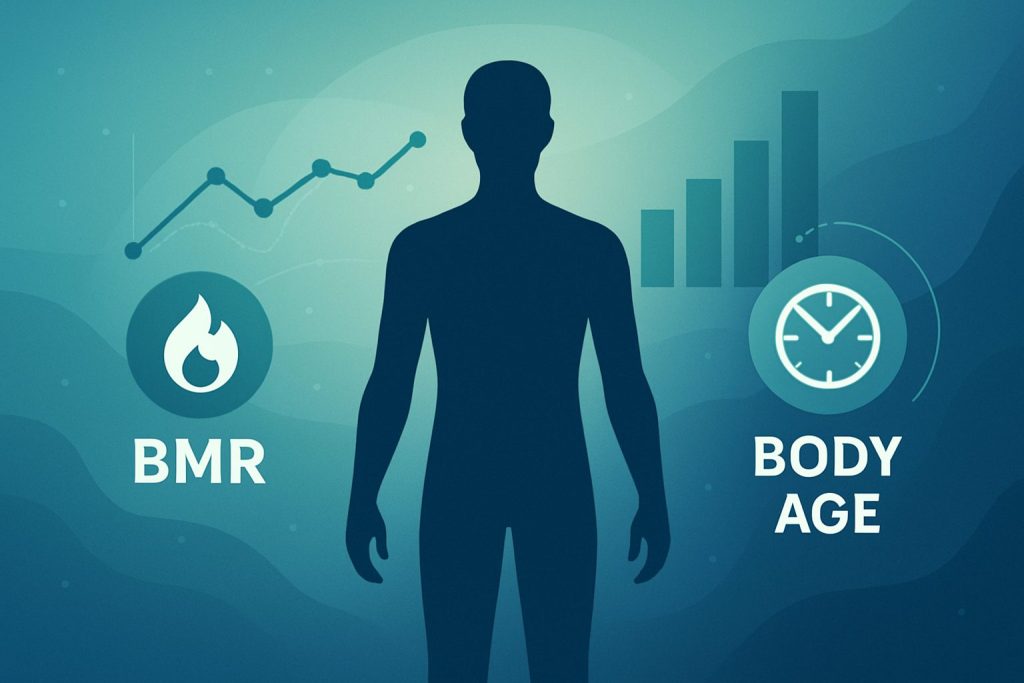Our body’s health can be measured in several ways. Concepts like body age, metabolic rate, BMR (Basal Metabolic Rate), and BMI (Body Mass Index) often come up in conversations about fitness, health, and lifestyle choices. These terms are interconnected and crucial for understanding how our body functions and how to improve overall health. Let’s break them down step-by-step and provide clarity on how to measure these metrics.
1. What Is Body Age?
Body age is a measure of how old your body appears biologically as opposed to your chronological age. Factors like diet, exercise, sleep, and stress levels can either improve or accelerate your body’s aging process.

How to Measure Body Age:
- Body age is typically calculated using a body composition analyzer, which measures metrics like muscle mass, body fat percentage, and visceral fat.
- Apps or smart fitness devices often integrate body age calculators to estimate this metric based on physical activity and health data.
Tip: Improve your body age by adopting regular exercise, healthy eating habits, and stress management techniques.
2. What Is Metabolic Rate?
Your metabolic rate is the amount of energy (calories) your body needs to perform basic functions such as breathing, circulation, and cell production.
Types of Metabolic Rate:
- Basal Metabolic Rate (BMR): This represents the minimum number of calories your body requires to maintain basic life functions while at rest.
- Active Metabolic Rate (AMR): This includes the calories burned through daily activities and exercise.
3. What Is BMR?
BMR stands for Basal Metabolic Rate. It is a key indicator of your metabolism, as it determines the number of calories your body needs to stay alive when at complete rest.
Key Factors That Affect BMR:
- Age: BMR decreases as you age.
- Gender: Men generally have a higher BMR than women due to more muscle mass.
- Weight and Height: Larger body sizes burn more calories at rest.
- Body Composition: Higher muscle mass results in a higher BMR.
4. How to Calculate BMR?
BMR can be calculated using several methods. The most common formula is the Harris-Benedict Equation:
Harris-Benedict Formula:
- For Men:
BMR = 88.36 + (13.4 × weight in kg) + (4.8 × height in cm) – (5.7 × age in years) - For Women:
BMR = 447.6 + (9.2 × weight in kg) + (3.1 × height in cm) – (4.3 × age in years)
Online BMR Calculators:
There are online tools that can quickly calculate your BMR when you input your weight, height, age, and gender.
5. What Is BMI and How Does It Relate to BMR?
BMI stands for Body Mass Index. Unlike BMR, BMI is a measure of body fat based on your weight relative to your height.
BMI Formula:
BMI = weight (kg) ÷ height (m²)
BMI Categories:
- Underweight: BMI less than 18.5
- Normal weight: BMI 18.5–24.9
- Overweight: BMI 25–29.9
- Obese: BMI 30 or greater
While BMI gives a quick estimate of whether you’re underweight, overweight, or within a healthy range, it does not account for muscle mass or distribution of fat.
6. Metabolic Age and How It Is Calculated
Your metabolic age is a comparison of your BMR to the average BMR of people in your chronological age group.
- If your metabolic age is lower than your chronological age, it’s an indicator of good health.
- If it’s higher, it may suggest areas for improvement like increasing physical activity or improving nutrition.
You can calculate metabolic age using advanced fitness trackers or body composition analyzers.
7. What Are Calories and Why Are They Important?
Calories are the units of energy that fuel your body. Understanding your caloric needs is essential for weight management.
Caloric Needs Based on BMR:
- Use your BMR to calculate your daily energy expenditure (including physical activity).
- Adjust calorie intake based on goals:
- To lose weight, consume fewer calories than you burn.
- To gain weight, consume more calories.
- To maintain weight, match your caloric intake to your daily expenditure.
8. Why Understanding These Metrics Matters
- Body Age: Tracks your health progress.
- BMR: Helps design effective calorie-based diets.
- BMI: Identifies potential health risks related to weight.
- Metabolic Rate: Indicates how efficiently your body uses energy.
Summary of Tools and Calculators:
- BMR Calculators: Easily available online for quick calculations.
- Metabolic Age Analyzers: Found in advanced fitness trackers or gym equipment.
- BMI Calculators: Handy tools for determining your weight category.
By understanding these metrics and applying them to your daily life, you can make informed decisions about diet, fitness, and overall wellness. Start by calculating your BMR or BMI today to take the first step toward a healthier you!
Take the next step: Check your BMR, BMI, and body age instantly on our Smart Health Kiosk
Understanding BMR, BMI, metabolic rate, and metabolic age is powerful—now make it practical with a quick, clinical-grade screening on the Clinics On Cloud Smart Health Kiosk. Our Health ATM measures 50+ parameters using FDA/CE-certified devices and generates a digital report within minutes, helping translate today’s learnings into action.
- What it measures in minutes: blood pressure, SpO2, heart rate, temperature, BMI, body composition indicators, 12‑lead ECG, sugar screening, lipid profile (device-enabled), and more—consolidated into a clear health summary aligned with your BMR/BMI goals.
- Instant reports and guidance: get on-screen and printable reports, with optional telemedicine consults to interpret BMR/BMI and metabolic risk trends right away.
- Medical‑grade, secure, and compliant: devices are FDA/CE approved; platform is HIPAA/ISO 27001/GDPR compliant, and we’re India’s first ISO 13485 and CDSCO‑approved health kiosk manufacturer.
- Built for anywhere access: compact, portable kiosk with 3–4‑day battery backup and offline mode—ideal for housing societies, offices, gyms, clinics, and community drives.
- Fast setup, easy to use: plug‑and‑play installation with a simple guided interface—no technical expertise required.
How this helps your goals today:
- If the focus is BMR: pair your measured vitals with an on‑kiosk screening to establish a baseline and track metabolic improvements over time.
- If the focus is BMI and body age: use body metrics from the kiosk to monitor fat %, visceral fat indicators, and heart health markers that influence metabolic age.
- If the focus is prevention: early insights on blood pressure, ECG, and lipids support timely lifestyle changes and follow‑ups.
Ready to try the Smart Health Kiosk or bring it to a location?
- Explore our Health Kiosk lineup, certifications, and deployment options, and book a demo on our main page.
- Organizations can deploy kiosks for workforce wellness, CSR camps, and community screenings with instant digital records and impact analytics.
Make your numbers work for you—screen, understand, and act with Clinics On Cloud’s Smart Health Kiosk.


